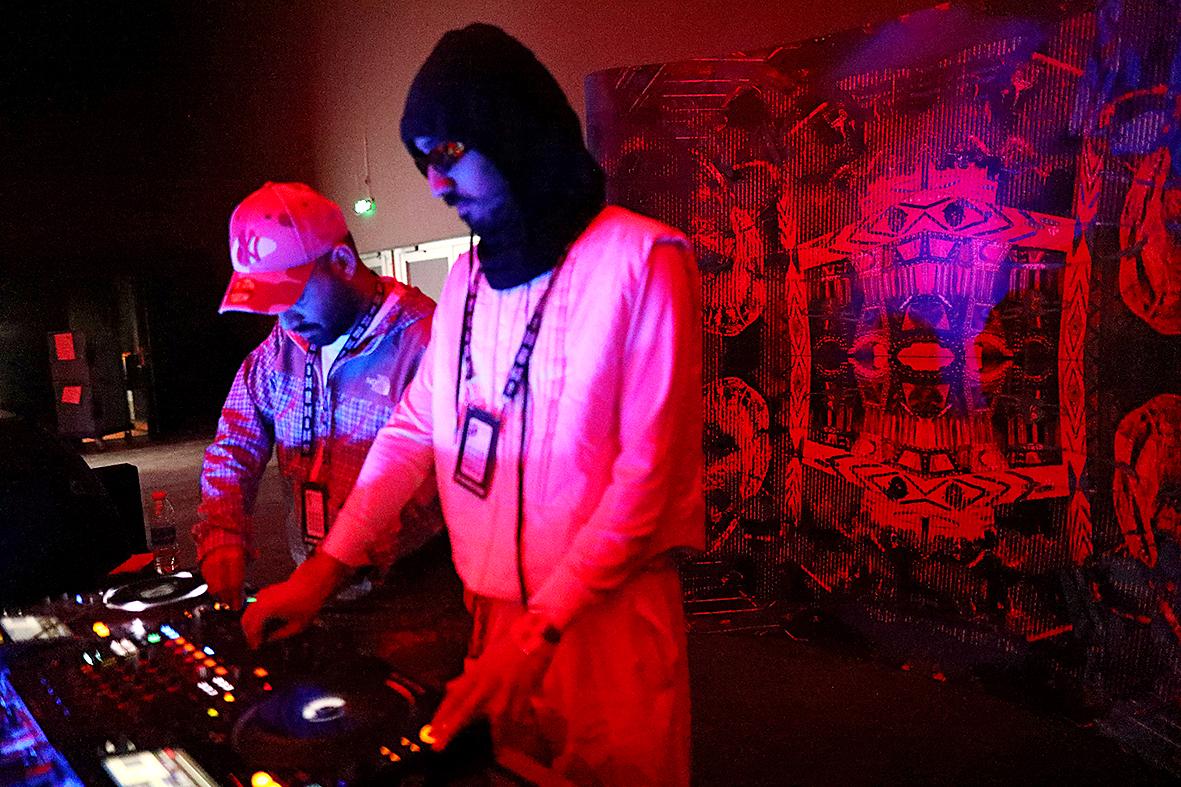The party in the Saudi desert looked like any other rave until the music stopped for the Islamic call to prayer, leaving attendees in ripped skinny jeans and combat boots to stand in silence.
Fifteen minutes later — religious duties completed — thousands of party-goers got back to business. Men and women danced with abandon in a country where that would have been unthinkable five years ago.
The electronic music festival in Saudi Arabia this weekend highlighted the changes catapulting through the conservative kingdom under its controversial crown prince, Mohammed bin Salman. In just a few years, the prince has lifted a ban on women driving, loosened gender segregation and defanged the religious police, who used to roam the streets punishing restaurants that played music.

Photo: AFP
In contrast, the four-day festival called MDL Beast Soundstorm was endorsed by the government and included performances by global DJs like Tiesto and Armin van Buuren. Organizers say more than 180,000 people attended the opening night, pushing boundaries as the kingdom transforms.
“Allow us progress, allow us to represent ourselves in the way that we feel fit,” said Prince Fahad Al Saud, a royal family member and entrepreneur who attended in a psychedelic-patterned jacket and sparkling eyeliner. “We are very eager to be part of the international community, but we can’t be stifled every time we try to make progress because it doesn’t look like what you want to see.”
DIZZYING MONTH

Photo: AFP
Indeed, the festival was part of a dizzying month in which Saudi Arabia hosted a Formula One race, two separate art biennials and a visit by French President Emmanuel Macron. All of it underlined the fact that any ostracism on the world stage has largely passed for Prince Mohammed, who faced global outcry after the 2018 murder of government critic Jamal Khashoggi by Saudi agents in Istanbul.
The prince’s plans to diversify the oil-dependent economy call for developing new sectors such as entertainment and tourism. And after closing the kingdom’s borders during much of the COVID-19 pandemic, officials seem eager to make up for lost time — even as the Omicron variant of the virus drives case surges in other countries.
At a recent international film festival in Jeddah, women strutted the red carpet in sleeveless gowns and an openly queer man, Adam Ali, won best actor. British supermodel Naomi Campbell was photographed sitting on the floor in front of a traditional Saudi meal, eating with her hands.

Photo: Bloomberg
“Now everything is here and the world has come to us,” marveled Abdullah Alghamdi, 29, who attended the weekend rave. “There are honestly so many events that you don’t know where to go.”
QUEER CULTURE
The scenes at the music festival were the most extreme of any yet. Women flaunted their style, wearing everything from skintight pants to full-length robes and face veils. Inebriated men stumbled through crowds perfumed with the distinct scent of marijuana, alongside a limited but notable display of local queer culture. Alcohol and homosexuality are still illegal in Saudi Arabia, but the event created a carnival-like atmosphere, opening the space to test limits.

Photo: Bloomberg
Any critical voices were largely silent. Under Prince Mohammed, Saudi Arabia’s social opening has come with a crackdown on domestic dissent. Driving that fact home, officials closed every other large-scale event in Riyadh “for maintenance” for the duration of the festival, sparking sardonic jokes about the government forcing people to attend. But to Ibrahim Fahad, a 21-year-old tourism and hospitality student, the festival was a long-awaited dream.
“I can’t even describe my feelings,” he said, posing for pictures as bass pounded in the background. “Before music opened up in Saudi Arabia, I used to travel to see artists like The Chainsmokers. Now I can stay at home, because they’re here.”

May 26 to June 1 When the Qing Dynasty first took control over many parts of Taiwan in 1684, it roughly continued the Kingdom of Tungning’s administrative borders (see below), setting up one prefecture and three counties. The actual area of control covered today’s Chiayi, Tainan and Kaohsiung. The administrative center was in Taiwan Prefecture, in today’s Tainan. But as Han settlement expanded and due to rebellions and other international incidents, the administrative units became more complex. By the time Taiwan became a province of the Qing in 1887, there were three prefectures, eleven counties, three subprefectures and one directly-administered prefecture, with

It’s an enormous dome of colorful glass, something between the Sistine Chapel and a Marc Chagall fresco. And yet, it’s just a subway station. Formosa Boulevard is the heart of Kaohsiung’s mass transit system. In metro terms, it’s modest: the only transfer station in a network with just two lines. But it’s a landmark nonetheless: a civic space that serves as much more than a point of transit. On a hot Sunday, the corridors and vast halls are filled with a market selling everything from second-hand clothes to toys and house decorations. It’s just one of the many events the station hosts,

Two moves show Taichung Mayor Lu Shiow-yen (盧秀燕) is gunning for Chinese Nationalist Party (KMT) party chair and the 2028 presidential election. Technically, these are not yet “officially” official, but by the rules of Taiwan politics, she is now on the dance floor. Earlier this month Lu confirmed in an interview in Japan’s Nikkei that she was considering running for KMT chair. This is not new news, but according to reports from her camp she previously was still considering the case for and against running. By choosing a respected, international news outlet, she declared it to the world. While the outside world

Through art and storytelling, La Benida Hui empowers children to become environmental heroes, using everything from SpongeBob to microorganisms to reimagine their relationship with nature. “I tell the students that they have superpowers. It needs to be emphasized that their choices can make a difference,” says Hui, an environmental artist and education specialist. For her second year as Badou Elementary’s artist in residence, Hui leads creative lessons on environmental protection, where students reflect on their relationship with nature and transform beach waste into artworks. Standing in lush green hills overlooking the ocean with land extending into the intertidal zone, the school in Keelung